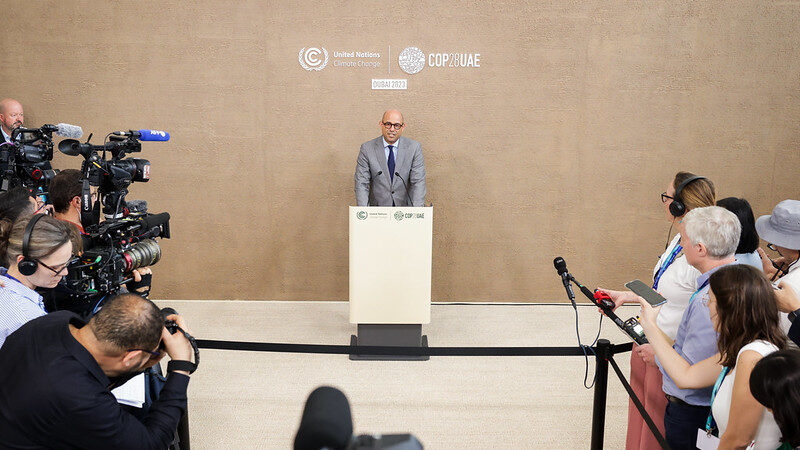Saudi Arabia, Iraq and Turkey are among the most vocal opponents of a decision at Cop28 to phase out coal, oil and gas
Saudi Arabia is one of the strongest opponents of a decision at Cop28 to out fossil fuels, as tensions grow near the end of the first week of negotiations.
Saudi energy minister Abdulaziz bin Salman publicly said “absolutely no” to a fossil fuel phase-out in an interview with Bloomberg on Tuesday. This position has been echoed in negotiating rooms, observers said.
“The countries that made their positions extremely clear on this are in particular Saudi Arabia, Iraq and Turkey,” said Romain Ioualalen, campaigner at Oil Change International, during a press huddle.
The main text being discussed at Cop28, the global stocktake of climate policies, includes an “energy package” of goals to phase out fossil fuels, triple renewable energy and double energy efficiency.
China and India don’t specifically oppose phase-out language, but they’re against targets grouped by sector, Ioualalen said. At Cop26 in Glasgow, the decision text singled out coal, their main source of energy, for censure. Both countries signed a G20 declaration earlier this year that agreed to triple renewable energy capacity but stalled on fossil fuel language.
After the first week of climate talks, negotiators will hand ministers the task of reaching agreements on most issues, as the draft still includes almost 90 options to pick from.
UN climate change secretary Simon Stiell told a press conference on Wednesday the text is “a grab bag of wish lists and heavy on posturing”. “The key now is to sort the wheat from the chaff,” he added.
The final deal from Cop28 will influence climate policy for the rest of the decade, as the upcoming round of national climate plans due in 2025 will be guided by this text.
“Pretty damned good week”
US climate envoy John Kerry said Cop28 started with “a pretty damned good week”, citing the approval of the loss and damage fund — which he insisted on calling “climate impacts response fund”— and eight informal pledges, including on renewables and health.
Kerry added negotiators would be “working hard” to reach agreements on the second week. “If you’re going to reduce emissions and you’re actually going to hit the target of net zero by 2050, you have to do some phasing out. There’s no other way to get to that target,” he said.
When asked about the potential obstacles to reach a deal on fossil fuels, Kerry said: “It’s time for adults to behave like adults and get the job done.”
Earlier in the week, more than 100 European, African and island states signed a joint statement calling for a phase-out of unabated fossil fuels and peak in their consumption this decade. It is the single biggest issue civil society is rallying behind at Cop28.
A draft published at 05:00 on Tuesday included three options on phasing out fossil fuels: a short and ambitious text, a longer one with more qualifiers, and no text at all.
The 24-page draft of the global stocktake published on Tuesday includes two forms of language on fossil fuel phase-out and an option to scrap it completely. The middle ground includes qualifiers “accelerating efforts” to phase out “unabated” fossil fuels and their “use” — without mentioning production.
Adaptation falling behind
So far, fossil fuels have taken the centre stage at Cop28. But in the closing plenary of the first week, developing countries complained that this was leaving adaptation talks behind.
Countries will also need to resolve talks on a global goal for adaptation — which were close to collapse in the lead up to Cop28 — and increasing finance for adaptation.
The groups of African nations, small islands, Latin American states and least developed countries all raised concerns on the slow pace of negotiations around adaptation finance. Crucially, one observer said, this is also a priority for the Arab group.
“The progress made this Cop is unsatisfying. We were expecting to reach ambitious outcomes in all adaptation agenda items. We need to work together next week to ensure an ambitious and inclusive outcome for the (global goal on adaptation),” said the Saudi negotiator.
“Efforts have been made to advance mitigation faster than adaptation, finance, just transition response measures,” said Bolivia’s chief negotiator, Diego Pacheco.
This story w
Read More

